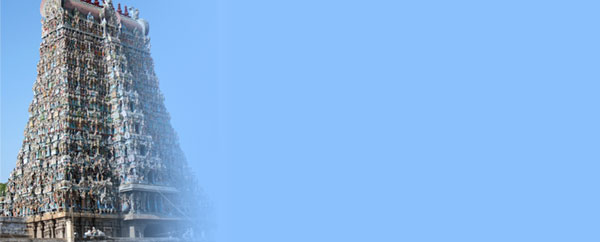Meenakshi Temple (Tamil Nadu)
The Chitirai Festival in April/May sees the idols
being taken around on their chariots in celebration
of the divine marriage.
Meenakshi Temple (Tamil Nadu) Hindu Temples

Thousands of temples with lofty
towers dot the skyline of the southernmost state of Tamilnadu in
India. These temples are torchbearers of the glorious heritage of
the Tamil speaking region. Madurai is called the `Athens of the
East' because of the way myth meets life here. Legends of warrior
princesses, the gods falling in love and divine promises abound.
Originally called Madhurapuram because honey (madhu) is said to
have dripped off the locks of Shiva here, Madurai is now the second
largest city in Tamil Nadu. is now among the most important pilgrimages
for Hindus.
History
The original temple was built by Kulasekara Pandya, but the entire
credit for making the temple as splendid as it is today goes to
the Nayaks. The Nayaks ruled Madurai from the 16th to the 18th century
and left a majestic imprint of their rule in the Meenakshi - Sundareswarar
Temple.
Architecture
The grand gopurams of the Meenakshi Sundareshwar Temple tower over
the city at the heart of which they stand. The temple complex covers
6 hectares right in the middle of the city and is flush with visitors
from all over, each and every day. The temple is dedicated to Shiva
and Meenakshi, an earthly incarnation of his wife Parvati, who was
born to the childless ruler after many a prayer.
The towers that loom overhead are famous for detailed carvings of
the gods and goddesses, mythological figures and running depictions
of legendary tales. The huge southern gopuram has over 1500 sculptures!
The Temple Museum is at the 'thousand- pillared hall' where each
of the 985 pillars are carved in great detail. 5 km east of the
temple is the Mariamman Teppakulum tank where the annual Float Festival
is held in January. The Shiva Meenakshi idols are taken out of the
temples and float on decorated rafts for several days before returning.
Entry into the sanctum sanctorum of the Shiva temple is restricted
to Hindus, and in the Meenakshi temple to Hindu women.
The Chitirai Festival in April/May
sees the idols being taken around on their chariots in celebration
of the divine marriage. The zestful thumping of drums or nadaswarams
accompanies the procession.
Climate
Madurai is warm most of the year with maximum temperatures varying
from 37°C in summer to 29°C in winter. Minimum temperatures
in winter hardly ever fall below 20°C. Rainfall is frequent.
Best Time to Visit
While it is true that the cooler months between November and February
are far more pleasant, Madurai can be visited almost anytime through
the year - just skip the summer.
Travel Connectivity
By Air : Madurai is connected by air with Mumbai and Chennai.
Madurai airport is 10-km away from the city.
By Rail : Madurai has direct
rail connections to Bangalore, Coimbatore, Kollam, Chennai, Rameshwaram,
Thanjavur, Tiruchirappalli, Tirunelveli, Tirupathi and Tuticorin.
By Road : There are excellent roads connecting Madurai to
all parts of South India. Madurai city has 5 Major Bus Stands- Periyar
Bus Stand, Anna Bus Stand, Palanganatham Bus Stand, Arapalayam Bus
Stand, Mattuthavani Bus Stand. From Madurai town buses, suburban
buses, taxis, auto rickshaws and cycle rickshaws are available to
reach the temple.
Other links
Hindu Temples in India
temples
Tamil Nadu